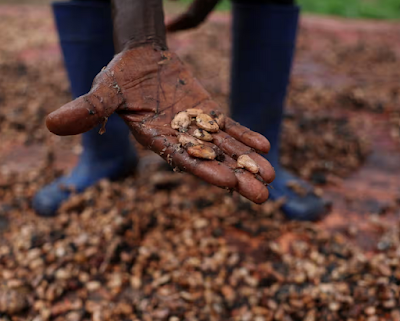Climate breakdown and wildlife loss are deepening the EU’s “chocolate crisis”, a report has argued, with cocoa one of six key commodities to come mostly from countries vulnerable to environmental threats.
More than two-thirds of the cocoa, coffee, soy, rice, wheat and maize brought into the EU in 2023 came from countries that are not well prepared for climate change, according to the UK consultants Foresight Transitions.
For three of the commodities – cocoa, wheat and maize – two-thirds of imports came from countries whose biodiversity was deemed not to be intact, the analysis found.
The researchers said the damage to food production by climate breakdown was made worse by a decline in biodiversity that has left farms less resilient.
“These aren’t just abstract threats,” said the lead author of the report, Camilla Hyslop. “They are already playing out in ways that negatively affect businesses and jobs, as well as the availability and price of food for consumers, and they are only getting worse.”
The researchers mapped trade data from Eurostat on to two rankings of environmental security to assess the level of exposure for three staple foods and three critical inputs into the EU’s food system.
They used a ranking of climate readiness from the Notre Dame Global Adaptation Index, which combines a country’s vulnerability to climate damages with its access to financial and institutional support, and a ranking of biodiversity intactness from the UK Natural History Museum, which compares the current abundance of wild species to pre-modern levels.
They found the majority of imports came from countries they ranked “low-medium” on the climate scale and “low-medium” or “medium” on the biodiversity scale.
Some food products were particularly exposed. The EU imported 90% of its maize from countries with low-medium climate readiness and 67% from countries with medium or lower biodiversity intactness, the report found.
For cocoa, a key ingredient in the chocolate industry that Europe does not grow itself, the import exposure was 96.5% for climate preparedness and 77% on the biodiversity scale, the report found.
The industry is already struggling with rises in the price of sugar, driven in part by extreme weather events, and supply shortages of cocoa. Most of its cocoa comes from west African countries facing overlapping climate and biodiversity risks.
The report, which was commissioned by the European Climate Foundation, argued that large chocolate manufacturers should invest in climate adaptation and biodiversity protection in cocoa-growing countries.
“This is not an act of altruism or ESG [sustainable finance], but rather a vital derisking exercise for supply chains,” the authors wrote. “Ensuring farmers are in their supply chains paid a fair price for their produce would allow them to invest in the resilience of their own farms.”
Paul Behrens, an environmental researcher at the University of Oxford and author of a textbook on food and sustainability, who was not involved in the research, said the findings painted an “extremely worrying picture” for food resilience.
“Policymakers like to think of the EU as food-secure because it produces quite a lot of its own food,” he said. “But what this report shows is that the EU is vulnerable to climate and biodiversity risks in some vital food supply chains.”
The report found coffee, rice and soy had fewer risks overall but noted hotspots of concern. Uganda, which provided 10% of the EU’s coffee in 2023, had low climate preparedness and low-medium biodiversity intactness, the report found.
Joseph Nkandu, founder of the National Union of Coffee Agribusinesses and Farm Enterprises in Uganda, called for more access to international climate finance to help farmers become more resilient in the face of worsening weather.
“The weather in Uganda is no longer predictable,” he said. “Heatwaves, prolonged dry spells and erratic rains are withering our coffee bushes and damaging production.”
Marco Springmann, a food researcher at the University of Oxford, who was not involved in the research, said a shift to healthier and more sustainable diets would be needed for food systems to withstand climate shocks.
“About a third of grains and basically all imported soy is used to feed animals,” he said. “Aiming to make those supply chains more resilient therefore misses the point that this supports the very products that are to a large degree responsible for what is being tried to protect from.”







